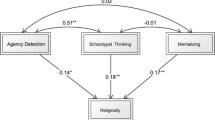Abstract
This research investigated whether individuals who were members of a religious group in which they participated in a guru-devotee relationship differ in particular psychological and developmental ways (the need to be mirrored, the need to idealize, and retrospective perceptions of styles of having been parented) from individuals who were members of other groups, religious or non-religious. One hundred and eight subjects were drawn from three groups: (a) a Hindu based guru-devotee group, (b) a Unitarian Universalist Church with a non-hierarchical polity, and (c) a non-religious group, a computer company. Subjects were men and women ranging in age from 23 to 83. Each completed the Goal Instability and Superiority Scales (GIS) the Parental Authority Questionnaire (PAQ) and a demographics questionnaire. Results demonstrated no statistically significant differences among the groups on the measures of idealizing, mirroring, and perceived styles of having been parented, thus challenging the conventionally held belief that guru-devotee involvement is indicative of pathology.
Similar content being viewed by others
REFERENCES
Bell, D. (1976). The cultural contradictions of capitalism. New York: Basic Books.
Browning, D. S. (1983). Religious ethics and pastoral care. Philadelphia: Fortress Press.
Clinebell, H. (1966). Basic types of pastoral counseling. Nashville: Abingdon Press.
Cushman, P. (1986). The self besieged: Recruitment-indoctrination processes in restrictive groups. Journal for the Theory of Social Behavior, 16(1), 1-32.
Frankena, W. K. (1963). Ethics. New Jersey: Prentice-Hall, Inc.
Gerkin, C. V. (1984). The living human document: Re-visioning pastoral counseling in a hermeneutical mode. Nashville: Abingdon Press
Goodenough, E. R. (1965). The psychology of religious experiences. New York: Basic Books, Inc.
Holifield, B. E. (1983). A history of pastoral care in from salvation to self-realization. Nashville, TN: Abingdon Press.
James, W. (1902) The varieties of religious nature. New York: Macmillan Publishing Co.
Jordan, M. J. (1986). Taking on the gods: The task of the pastoral counselor. Nashville, TN: Abingdon Press.
Kriegman, D. (1980). A psycho-social study of religious cults from the perspective of self psychology [CD-ROM]. Abstract from: ProQuest File: Dissertation Abstracts Item: AAC8024199
Kriegman, D., & Solomon, L. (1985b). Cult groups and the narcissistic personality: The offer to heal defects in the self. International Journal of Group Psychotherapy, 35(2) 239-261.
La Barre, W. (1970). The ghost dance: Origins of religion. New York: Doubleday Publishers.
Lapsley, J. N. (1986). The “self,” its vicissitudes and possibilities: An essay in theological anthropology. Pastoral Psychology, 35(1) 23-45.
McDargh, J. (1983). Psychoanalytic object relations and the study of religion. Lanham, MD: University Press of America.
Niebuhr, H. R. (1963). The responsible self: an essay in christian moral philosophy. New York, NY: Harper & Row.
Oates, W. E. (1966). Pastoral counseling in social problems: Extremism, race, sex, divorce. Philadelphia, PA: The Westminster Press.
Pond, E. (1844). The young pastor's guide; or lectures on pastoral duties. Bangor, ME: E.F. Duren Publisher.
Pruyser, P. W. (1976). The minister as diagnostician: Personal problems in a pastoral perspective. Philadelphia: The Westminster Press.
Rizzuto, A-M. (1979). The birth of the living god. Chicago, IL: The University of Chicago Press.
Schlauch, C. R. (1985). Defining pastoral psychotherapy. The Journal of Pastoral Care, 39(3) 219-228.
Schlauch, C. R. (1987). Defining pastoral psychotherapy II. The Journal of Pastoral Care, 41(4) 319-326.
Sharpe E. J. (1975). Comparative religion: A history. La Salle, Illinois: Open Court Publishing Company.
Temerlin, M. K., & Temerlin, J. W. (1982). Psychotherapy cults: An iatrogenic perversion. Psychotherapy: Theory, Research and Practice, 19(2) 131-141.
Watson, P. J., Little, T., & Biderman, M. D. (1992). Narcissism and parenting styles. Psychoanalytic Psychology 9(2) 231-244.
Author information
Authors and Affiliations
Additional information
Private practice in
Rights and permissions
About this article
Cite this article
Martignetti, C.A. Gurus and Devotees: Guides or Gods? Pathology or Faith?. Pastoral Psychology 47, 127–144 (1998). https://doi.org/10.1023/A:1022961613051
Issue Date:
DOI: https://doi.org/10.1023/A:1022961613051




